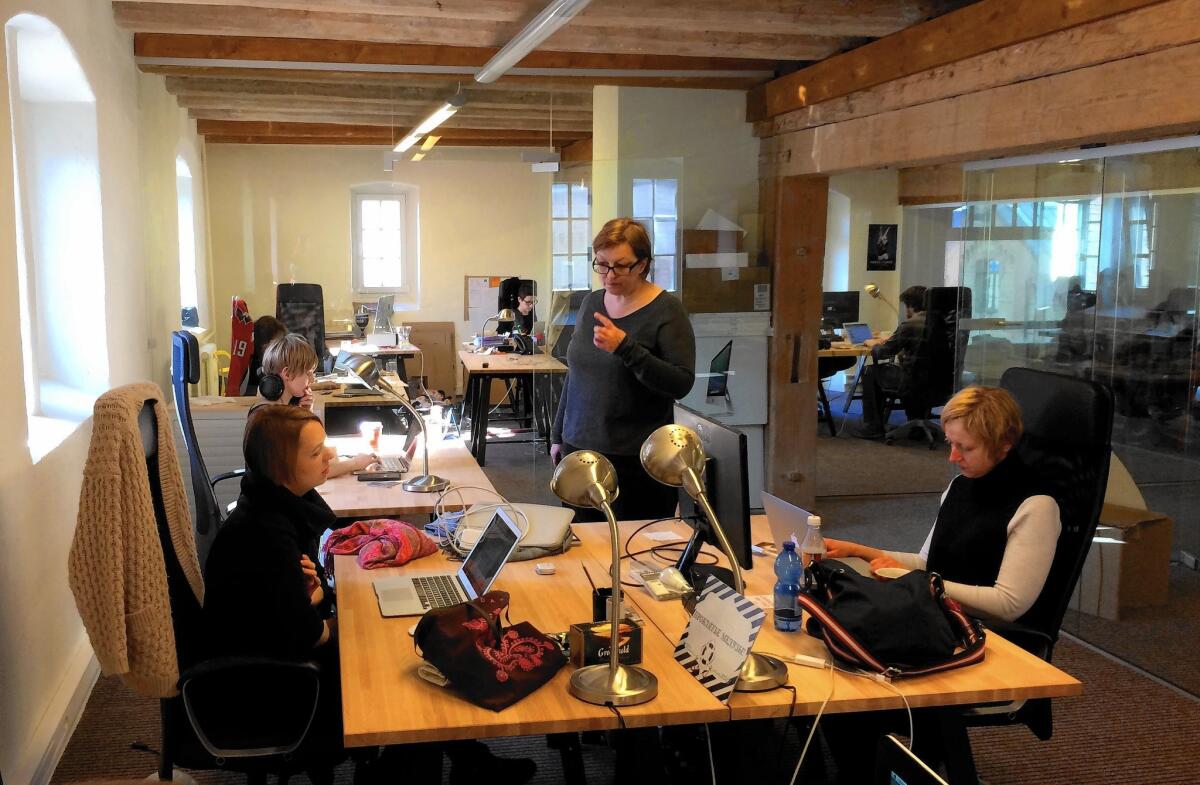At Meduza, self-exiled Russian journalists avoid Kremlin censorship

- Share via
Reporting from Riga, Latvia — The office of the Meduza Project brims with light and open space, a metaphor for the freedom that the dozen journalists who left Russia to avoid censorship feel in their newfound home.
The white-washed interior walls of a 200-year-old former grain warehouse where the reporters work are cut with faceted windows overlooking the Daugava River and the sun-splashed plains east of Riga. Ochre and pink bricks forming the building’s arched windows and pitched, crenelated roofline evoke the architecture of the Hanseatic League that in the late Middle Ages united Northern European ports from Rotterdam to Tallinn in a trade and defense confederation.
Inside, the 11 a.m. news meeting is running overtime as the journalists ponder how best to present the latest actions of Russian state media censors in outlawing reports on the motives behind suicide.
The edict is intended to prevent a Meduza Project report from spreading to publications in Russia: It says that at least 12 cancer sufferers in Moscow took their lives in February because government-run hospitals denied them pain management medications.
“We were looking into why the government has gotten involved in determining who gets pain medications and who doesn’t,” said Konstantin Benyumov, editor of Meduza’s English-language edition.
Eventually, the meeting adjourns and reporters disperse to their laptops on sleek blond-wood desks atop wrought-iron sawhorses. Some dash downstairs first to the wind-swept courtyard for a smoke or the daily call home to family in Moscow.
Meduza’s reporters and editors are an outgrowth of the late Lenta.ru investigative news organization that, like most independent media in Russia, has been subverted by politically motivated firings and stifled by government edicts criminalizing reporting on embarrassing issues.
Like its namesake mythological Greek monster whose severed head retained the power to turn into stone all who gazed into her eyes, the Meduza Project’s self-exiled Russian staff lives on, bedeviling Kremlin efforts to control and manipulate information.
A year ago, Lenta editor Galina Timchenko was fired, reportedly for publishing an interview with a member of the Ukrainian nationalist militia Right Sector.
“It was just the pretext for her firing, as it wasn’t banned at that time,” Benyumov said of the Ukrainian paramilitary now battling pro-Russia separatists in eastern Ukraine.
In solidarity with their editor, 74 of Lenta’s 82 employees resigned, leaving the publication ripe for ideological takeover by the Kremlin.
Six months ago, Timchenko and a dozen Lenta veterans moved to Riga, bankrolled by donations from well-heeled Russian supporters of media freedom. They seek to resurrect their crusading journalism and recover their loyal readership.
“We have 2.5 million unique views a month and this we are trying to monetize,” said Timchenko, a determined businesswoman of late middle age.
The mission to replicate the work of Lenta was initially backed by Kremlin nemesis and disenfranchised oil magnate Mikhail Khodorkovsky, Timchenko said. But their visions of Lenta’s afterlife conflicted, and the association with Khodorkovsky, who spent a decade in prison for challenging Russian leader Vladimir Putin, exposed the project to “vulnerabilities,” the editor said.
“We want our publication to be completely independent,” she said. “We don’t want to be the plaything of any oligarch.”
Seventy percent of Meduza’s readership is in Russia, and most of the rest is in countries with large Russian emigre communities — Israel, Germany, the United States — Benyumov said.
The website is a compilation of original reporting by colleagues still in Russia and posted articles of other media, domestic and foreign. Investigative projects that brought Lenta to the forefront of Russian journalism continue, with collaboration between the remote headquarters here and stealthy reporters and freelancers in Russia.
Last month, the website carried a series of articles on the Russian government’s falsification of crime statistics and the effect of the underreporting on efforts to curb violence and corruption. A retrospective on the life of opposition leader Boris Nemtsov, killed near the Kremlin in February, resides prominently on the site, https://www.meduza.io.
The transplanted journalists say they miss home but feel comfortable in exile.
“We all have jobs here, so we don’t feel like refugees. Half the population of this city is Russian-speaking. It’s only an hour and 20 minutes to Moscow by air, and most of us fly home once a month,” Benyumov said, calling their displacement “immigration light.”
More to Read
Sign up for Essential California
The most important California stories and recommendations in your inbox every morning.
You may occasionally receive promotional content from the Los Angeles Times.











